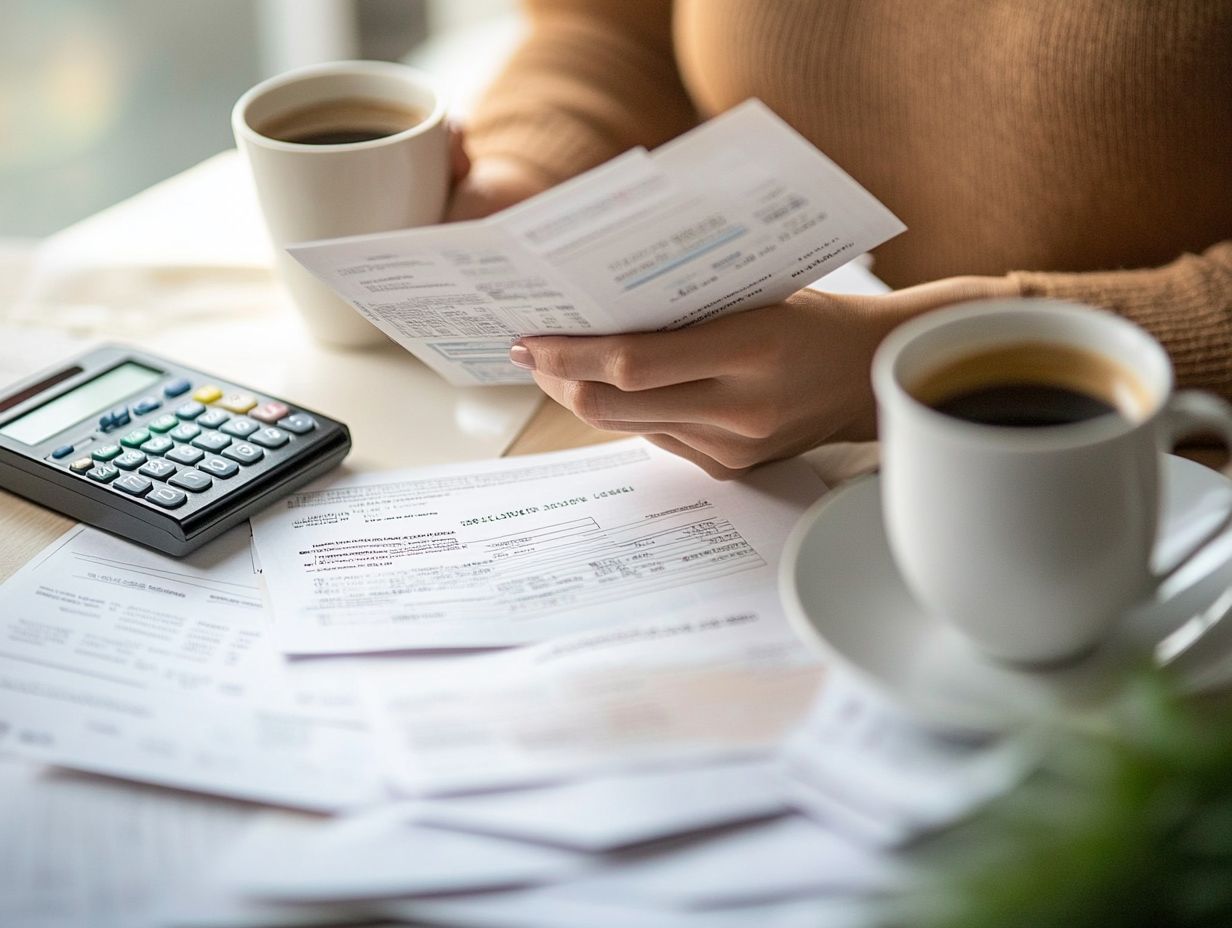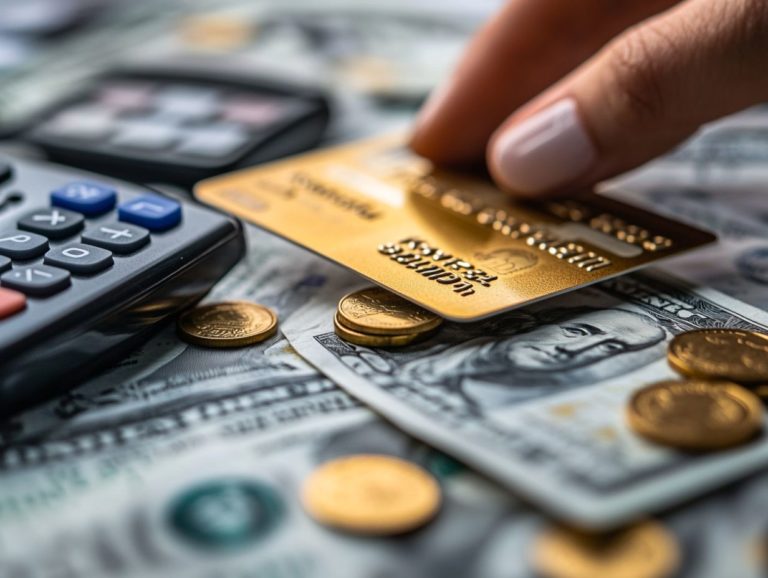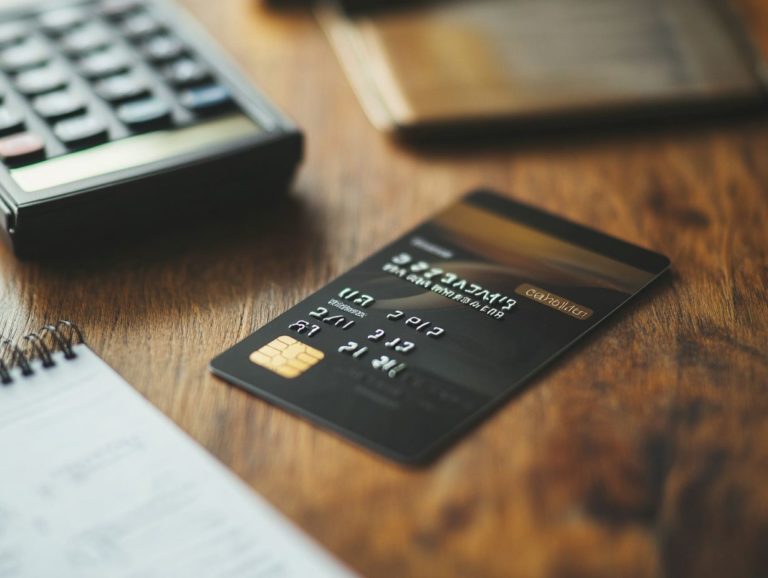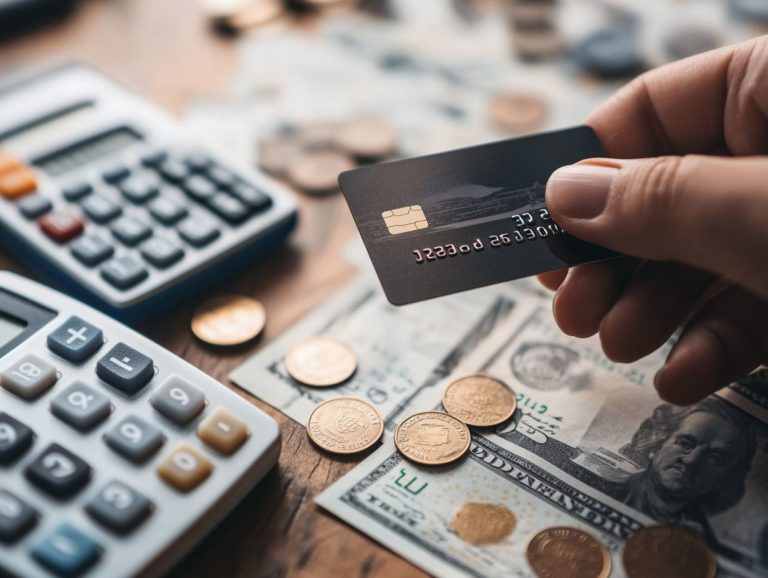Understanding the Cash Back Card Approval Process
Ready to make your spending work for you? Cash back cards are a smart choice for earning rewards!
Cash back cards have emerged as an appealing option for those seeking to earn rewards on their daily expenditures.
Navigating the approval process can be somewhat daunting, particularly if you’re uncertain about what lenders seek in applicants.
This article delves into what a cash back card entails and the advantages it provides, while also examining the various factors that can influence your chances of approval.
You ll also discover effective tips for enhancing your application success and valuable steps to take in the event of a denial.
Prepare to dive in and unlock the full potential of your cash back rewards!
Contents
- Key Takeaways:
- What is a Cash Back Card?
- Factors that Affect Approval for a Cash Back Card
- Steps to Increase Approval Chances
- What to Do if Your Application is Denied
- Frequently Asked Questions
- What is a cash back card?
- How does the cash back card approval process work?
- What factors are considered in the cash back card approval process?
- Will having a low credit score affect my chances of getting approved for a cash back card?
- Can I apply for a cash back card if I have no credit history?
- What should I do if my cash back card application is denied?
Key Takeaways:

What is a Cash Back Card?
A cash back card serves as a useful financial tool, allowing you to earn cash rewards on eligible purchases and offering a compelling incentive for your everyday spending decisions.
These credit cards come in various formats, including flat-rate and tiered rewards structures, powering you to maximize your cash back on specific spending categories like groceries and online shopping.
Prominent credit card issuers such as Capital One, Chase Freedom, Discover it, and Bank of America provide these options, frequently featuring attractive welcome bonuses that elevate their overall appeal.
Explanation of Rewards and Benefits
Cash back cards present a wealth of rewards and benefits that can greatly enhance your purchasing power, enabling you to earn cash back on every eligible purchase you make.
These cards feature various earning structures, allowing you to receive a percentage back on spending categories that matter most to you, such as groceries, gas, or dining. This means you can maximize your rewards based on your unique spending habits.
Promotional offers serve as attractive incentives, encouraging you to spend more and earn even higher cash back percentages for a limited time or on specific purchases.
To elevate your rewards experience, consider utilizing cashback apps that track your spending and offer extra opportunities to earn cash back with partnered retailers. Once you’ve accumulated enough cash back, you can redeem your rewards in multiple ways, whether as statement credits that reduce your monthly bills or converted into gift cards. This flexibility ensures a truly rewarding financial experience tailored to your lifestyle.
Factors that Affect Approval for a Cash Back Card
When you apply for a cashback card, various factors come into play regarding approval, with your credit score standing out as one of the most essential elements that credit card issuers evaluate to assess your credit reliability.
Credit Score and History

Your credit score and history are crucial indicators of your financial responsibility, playing a significant role in your chances of being approved for a cash back card.
These scores depend on several key factors, including payment history, credit utilization, and the length of your credit accounts. Notably, payment history is paramount, accounting for about 35% of your total score. By consistently meeting payment deadlines, you can substantially enhance your credit profile.
Additionally, managing your credit utilization keeping your balances below 30% of your total credit limits can further improve your score, presenting you in a more favorable light to lenders.
Statistics show that a mere 20-point increase in your score can unlock opportunities for lower interest rates. Hence, adopting strategies like timely payments and diligent monitoring of your credit reports can pave the way for financial opportunities, including attractive offers on cash back cards.
Unlock your cash back rewards today and watch your savings grow!
Income and Employment Status
Income and employment status are crucial factors that credit card issuers weigh when evaluating your application for a cash back card. These elements offer valuable insight into your ability to manage payments effectively.
A steady income stream signals to issuers that you re less likely to default on payments. Fluctuations in employment stability may raise red flags regarding your financial reliability. For instance, if you have a higher income, you ll likely enjoy better approval rates and larger credit limits because issuers view you as a lower risk.
To boost your chances of getting approved, it s essential to present your income and employment details clearly. Highlighting a consistent work history and any additional sources of income can make a significant difference. Providing documentation, such as pay stubs or tax returns, boosts your credibility, showcasing your financial stability and making it easier to secure favorable terms on a cash back card.
Steps to Increase Approval Chances
To enhance your chances of being approved for a cash back card, it is crucial to take proactive measures. Focus on improving your credit score and ensure you present the required proof of income to the credit card issuer.
Taking these steps can significantly elevate your likelihood of approval.
Improving Credit Score
Improving your credit score is an essential step in securing a cash back card. It directly affects your ability to pay back money and the terms you can expect from credit offers.
By prioritizing a solid payment history making sure your bills are paid promptly and effectively managing the amount of credit you use compared to what you have available, you can significantly boost your score. These actions reflect responsible financial behavior and signal to lenders that you are a reliable borrower.
Over time, this dedication to financial discipline can lead to lower interest rates, higher borrowing limits, and greater access to premium credit products.
Understanding how these practices influence your long-term financial health fosters better decision-making, empowering you to make choices that enhance your financial future.
Providing Proof of Income

Providing proof of income is a vital step in the cash back card application process. It allows credit card issuers to evaluate your ability to repay any debt you may incur.
Having accurate documentation at your fingertips, such as recent pay stubs, W-2 forms, or tax returns, is essential for establishing your financial credibility. This verification process ensures that your application moves forward without hitches and plays a significant role in determining your credit limit and interest rates.
Gather these documents with care, keeping them organized and readily accessible. Make sure the information is current and reflects your true financial situation.
To present this information effectively, avoid discrepancies by double-checking your figures, highlighting key details, and summarizing the overall picture. This will streamline the review process for the credit provider and enhance your chances of approval.
What to Do if Your Application is Denied
If your application for a cash back card is denied, it’s crucial to grasp the reasons behind the rejection. Understanding these factors empowers you to take the necessary steps to enhance your chances of approval in the future.
Understanding the Reasons for Rejection
Understanding why your application might be denied is essential for you as a potential cardholder. This insight empowers you to make informed financial choices and rectify any issues before you decide to reapply.
Common pitfalls that often lead to denial include poor credit scores, which indicate your ability to pay back money, and insufficient income documentation, raising concerns about your ability to repay. To boost your chances, take the time to meticulously review your credit reports for any errors and work on improving your scores by paying down existing debts.
Collecting thorough financial documents, like pay stubs and tax returns, can strengthen your income claims. By addressing these significant factors, you can greatly enhance your likelihood of approval in future applications, ultimately opening the door to better financial opportunities.
Options for Reapplying or Alternative Cards
If you’re denied, consider your options for reapplying or exploring alternative cards that may better suit your financial profile and needs.
It’s wise to wait about six months before reapplying. This allows any negative marks to fade from your credit report.
When assessing alternative cards, take a close look at factors like annual fees, interest rates, and rewards structures. Weigh these elements carefully to ensure they align with your spending habits and long-term financial goals.
Effective communication with your credit card issuer can be incredibly beneficial. A polite conversation may reveal the reasons for your denial and help you make more informed decisions in the future.
Express your eagerness to improve your creditworthiness and ask about specific changes that could enhance your chances of approval.
Frequently Asked Questions

What is a cash back card?
A cash back card is a type of credit card that rewards you with a percentage of your purchase amount back as cash. This can be in the form of statement credits, direct deposits, or checks.
How does the cash back card approval process work?
The approval process for a cash back card is similar to any other credit card application. You will need to fill out an application, provide personal information, and undergo a credit check. For more details, you can refer to understanding the credit card application process. The lender will then review your application and credit history to determine if you are eligible for the card.
What factors are considered in the cash back card approval process?
The main factors that lenders consider when evaluating a cash back card application are your credit score, income, and debt-to-income ratio (the amount of debt you have compared to your income). They will also consider your employment status and any past credit history with the lender.
Will having a low credit score affect my chances of getting approved for a cash back card?
A low credit score can make it more difficult to get approved for a cash back card. However, some lenders may still offer you a card with a lower credit limit or higher interest rate. It’s important to work on improving your credit score before applying for any credit card.
Can I apply for a cash back card if I have no credit history?
Yes, some cash back cards are specifically designed for individuals with no credit history. These cards may have lower credit limits and higher interest rates, but can still help you build credit and earn cash back rewards.
What should I do if my cash back card application is denied?
If your cash back card application is denied, contact the lender to ask for an explanation. They may provide you with specific reasons for the denial and offer suggestions for improving your chances of approval in the future.
Check your credit report for any errors or focus on building your credit before applying again.
Wondering what to do next? Let’s explore your options!






